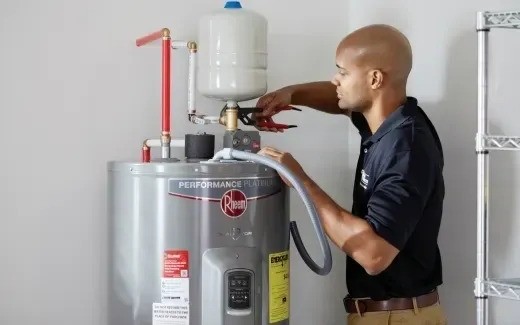
Best Time to Replace Your Water Heater: Avoid Surprises and Save Money Replacing your water heater before it fails can save you from sudden cold showers, water damage, and potentially costly repairs. But when is the “right” time to make the switch? Here’s a breakdown of factors that signal it’s time to replace your water heater before it breaks, ensuring you’re prepared and not caught off guard by a malfunctioning unit.
1. Age Matters: How Old is Your Water Heater?
Water heaters generally have a lifespan of 8-12 years for traditional tank models, and up to 20 years for tankless units. Once a water heater approaches these timeframes, it’s wise to consider a replacement, especially if it’s showing other signs of wear. Staying ahead of the curve with an upgrade will help you avoid the possibility of an unexpected breakdown.
2. Signs of Rust and Corrosion
If your water heater tank or any connections show signs of rust, it’s a red flag. Rust can compromise the structural integrity of the unit, potentially leading to leaks or cracks. Discolored water from the hot tap could indicate rust within the tank, which is often a precursor to more serious issues. At this stage, a replacement is often more cost-effective than attempting repairs.
3. Inconsistent Water Temperature
Does your water seem to fluctuate between hot and cold, or does it not get as hot as it used to? Inconsistent temperatures are a sign that your heater’s efficiency is dropping. While this may be fixed with a tune-up or by flushing the tank, it’s also a sign that your heater is nearing the end of its life, especially if it’s an older model.
4. Frequent Repairs Add Up
If you’ve needed to call for repairs more than once in the past year, it may be time to consider a replacement. Frequent repairs can be a strong indicator that your water heater is on its way out. At a certain point, the cost of ongoing repairs can add up to more than the cost of a new unit.
5. Leaking Water Heater Tank
A water heater with leaks around the base is a clear sign it’s time for a replacement. Leaks can be caused by sediment buildup, rust, or other internal issues that compromise the tank’s structure. Unfortunately, there isn’t a fix for a leaky tank—once a leak has started, replacing the unit is the only option to avoid a potential flood in your home.
6. Rising Energy Bills
If you notice your energy bills are increasing despite no change in your usage, your water heater might be to blame. Older units, especially those with sediment buildup, work harder to heat water, drawing more energy and increasing your utility costs. Upgrading to a more energy-efficient model can provide immediate savings on your energy bill.
7. Changing Household Needs
Perhaps your household has grown, and your water heater no longer meets your hot water demands. Or maybe your kids have moved out, and a smaller unit would be more efficient. When your water heater no longer suits your needs, it’s a good time to consider upgrading to a model that better matches your lifestyle.
Don’t Wait for an Emergency
Replacing a water heater at your convenience is much easier than rushing to find a replacement in an emergency. Proactively replacing your water heater allows you to explore energy-efficient options, benefit from modern advancements, and select the best unit for your needs.
Conclusion
Replacing your water heater before it breaks is not just about avoiding an inconvenience—it’s about making a smart decision to protect your home and potentially save money. If your water heater is nearing the end of its lifespan, showing signs of inefficiency, or causing your energy bills to rise, it might be time to look at replacement options. A little foresight goes a long way, especially when it comes to an essential household appliance like your water heater.
